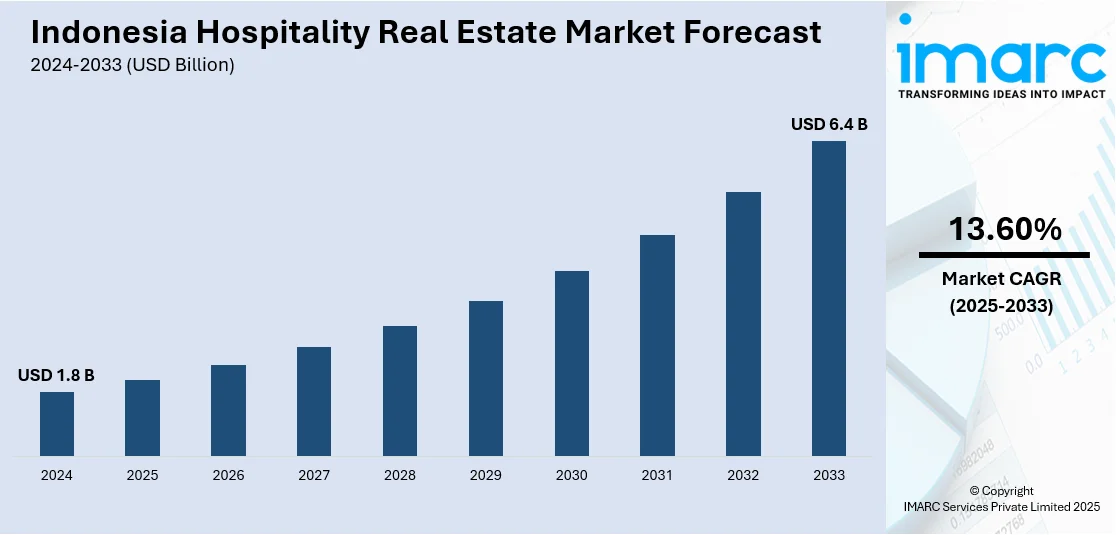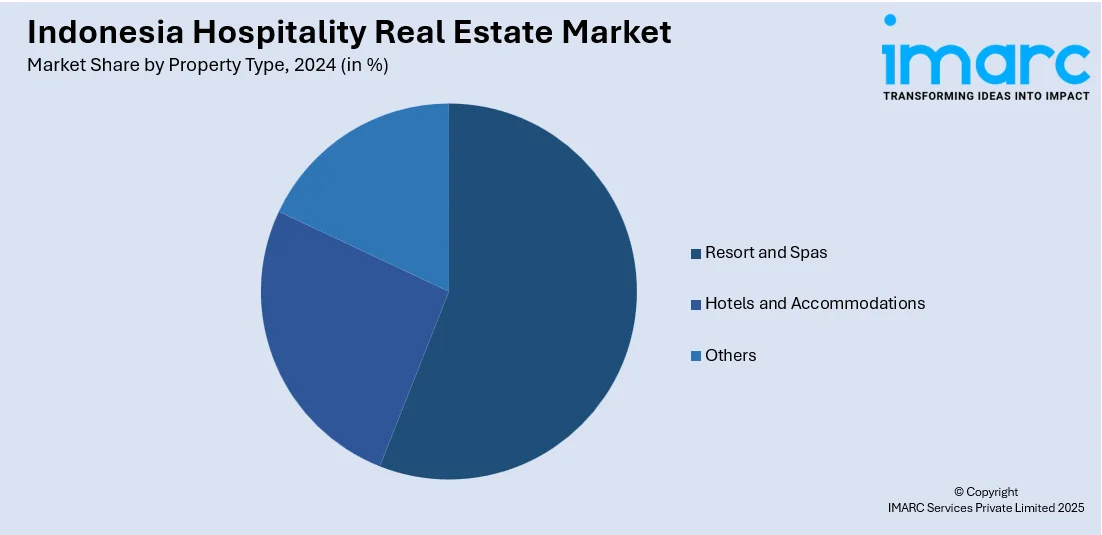
Indonesia Hospitality Real Estate Market Size, Share, Trends and Forecast by Property Type, and Region, 2025-2033
Market Overview:
Indonesia hospitality real estate market size reached USD 1.8 Billion in 2024. Looking forward, IMARC Group expects the market to reach USD 6.4 Billion by 2033, exhibiting a growth rate (CAGR) of 13.60% during 2025-2033. The increasing demand for quality accommodations and related services, the government's active support for infrastructure development, including airports and transportation systems, and the adoption of digital platforms for bookings represent some of the key factors driving the market.
|
Report Attribute
|
Key Statistics
|
|---|---|
|
Base Year
|
2024
|
|
Forecast Years
|
2025-2033
|
|
Historical Years
|
2019-2024
|
|
Market Size in 2024
|
USD 1.8 Billion |
|
Market Forecast in 2033
|
USD 6.4 Billion |
| Market Growth Rate 2025-2033 | 13.60% |
Hospitality real estate refers to properties primarily engaged in providing accommodations, dining, and other guest services. This sector includes a wide range of property types such as hotels, motels, resorts, serviced apartments, and even cruise ships. Some of the key aspects of hospitality real estate involve location, amenities, and customer service, all aimed at enhancing the guest experience. These properties often include value-added features like swimming pools, conference rooms, fitness centers, and restaurants to attract and retain clientele. Additionally, this type of real estate often provides diversified income streams, including room rentals, food and beverage sales, and event hosting, making it less susceptible to market downturns compared to other real estate sectors. Another benefit is the scalability, as successful hospitality models can be replicated across multiple locations.

To get more information on this market, Request Sample
Indonesia Hospitality Real Estate Market Trends:
The Indonesia hospitality real estate market is majorly driven by the growing tourism industry. This can be supported by Indonesia's natural beauty, cultural richness, and growing middle class. As tourism numbers continue to rise, the demand for quality accommodations and related services is following suit, thereby providing a boost to the investment in hotels, resorts, and serviced apartments. Another significant driver is the government's active support for infrastructure development, including airports and transportation systems, which enhances accessibility and thereby increases the attractiveness of the hospitality sector. Along with this, the ease of doing business in Indonesia, due to improved regulations, is encouraging more investments in the sector. Economic stability and growth prospects further contribute to creating a favorable environment for hospitality real estate development. In addition, technological advancements are also playing a critical role in shaping the market. Moreover, the adoption of digital platforms for bookings, the integration of smart technologies for enhancing guest experiences, and the use of data analytics for operational efficiency are trends that are positively impacting the sector. Furthermore, the growing consciousness about sustainability among both consumers and investors is contributing to the market. Eco-friendly, sustainable developments with low environmental impact are gaining traction, aligning with global trends toward responsible tourism and business practices. Additionally, the rise of the millennial and Gen Z travelers, who prioritize experiences over material goods, is adding another layer of demand for innovative and unique hospitality options. This younger demographic not only seeks quality accommodations but also desires local experiences, personalized services, and social-media-worthy moments, thus propelling further diversification and investment in the market. Some of the other factors driving the market include the escalating demand for personalized experiences and flexible accommodations for diverse needs such as business travel, family vacations, and long-term stays, rapid urbanization, changing consumer preferences, and inflating disposable income levels.
Indonesia Hospitality Real Estate Market Segmentation:
IMARC Group provides an analysis of the key trends in each segment of the market, along with forecasts at the country level for 2025-2033. Our report has categorized the market based on property type.
Property Type Insights:

- Resort and Spas
- Hotels and Accommodations
- Others
The report has provided a detailed breakup and analysis of the market based on the property type. This includes resort and spas, hotels and accommodations, and others.
Regional Insights:
- Java
- Sumatra
- Kalimantan
- Sulawesi
- Others
The report has also provided a comprehensive analysis of all the major regional markets, which include Java, Sumatra, Kalimantan, Sulawesi, and Others.
Competitive Landscape:
The market research report has also provided a comprehensive analysis of the competitive landscape in the market. Competitive analysis such as market structure, key player positioning, top winning strategies, competitive dashboard, and company evaluation quadrant has been covered in the report. Also, detailed profiles of all major companies have been provided.
Indonesia Hospitality Real Estate Market Report Coverage:
| Report Features | Details |
|---|---|
| Base Year of the Analysis | 2024 |
| Historical Period | 2019-2024 |
| Forecast Period | 2025-2033 |
| Units | Billion USD |
| Scope of the Report | Exploration of Historical Trends and Market Outlook, Industry Catalysts and Challenges, Segment-Wise Historical and Future Market Assessment:
|
| Property Types Covered | Resort and Spas, Hotels and Accommodations, Others |
| Regions Covered | Java, Sumatra, Kalimantan, Sulawesi, Others |
| Customization Scope | 10% Free Customization |
| Post-Sale Analyst Support | 10-12 Weeks |
| Delivery Format | PDF and Excel through Email (We can also provide the editable version of the report in PPT/Word format on special request) |
Key Benefits for Stakeholders:
- IMARC’s industry report offers a comprehensive quantitative analysis of various market segments, historical and current market trends, market forecasts, and dynamics of the Indonesia hospitality real estate market from 2019-2033.
- The research report provides the latest information on the market drivers, challenges, and opportunities in the Indonesia hospitality real estate market.
- Porter's five forces analysis assist stakeholders in assessing the impact of new entrants, competitive rivalry, supplier power, buyer power, and the threat of substitution. It helps stakeholders to analyze the level of competition within the Indonesia hospitality real estate industry and its attractiveness.
- Competitive landscape allows stakeholders to understand their competitive environment and provides an insight into the current positions of key players in the market.
Key Questions Answered in This Report
The Indonesia hospitality real estate market was valued at USD 1.8 Billion in 2024.
The Indonesia hospitality real estate market is projected to exhibit a CAGR of 13.60% during 2025-2033, reaching a value of USD 6.4 Billion by 2033.
The Indonesia hospitality real estate market is driven by booming tourism, rising middle-class domestic travel, and international investment in resort developments. Government initiatives to expand infrastructure and airport connectivity boost accessibility, along with growing interest in eco-resorts and experiential stays taps into sustainable travel trends, and increasing demand for MICE venues also supports market growth.
Need more help?
- Speak to our experienced analysts for insights on the current market scenarios.
- Include additional segments and countries to customize the report as per your requirement.
- Gain an unparalleled competitive advantage in your domain by understanding how to utilize the report and positively impacting your operations and revenue.
- For further assistance, please connect with our analysts.
 Request Customization
Request Customization
 Speak to an Analyst
Speak to an Analyst
 Request Brochure
Request Brochure
 Inquire Before Buying
Inquire Before Buying




.webp)




.webp)












